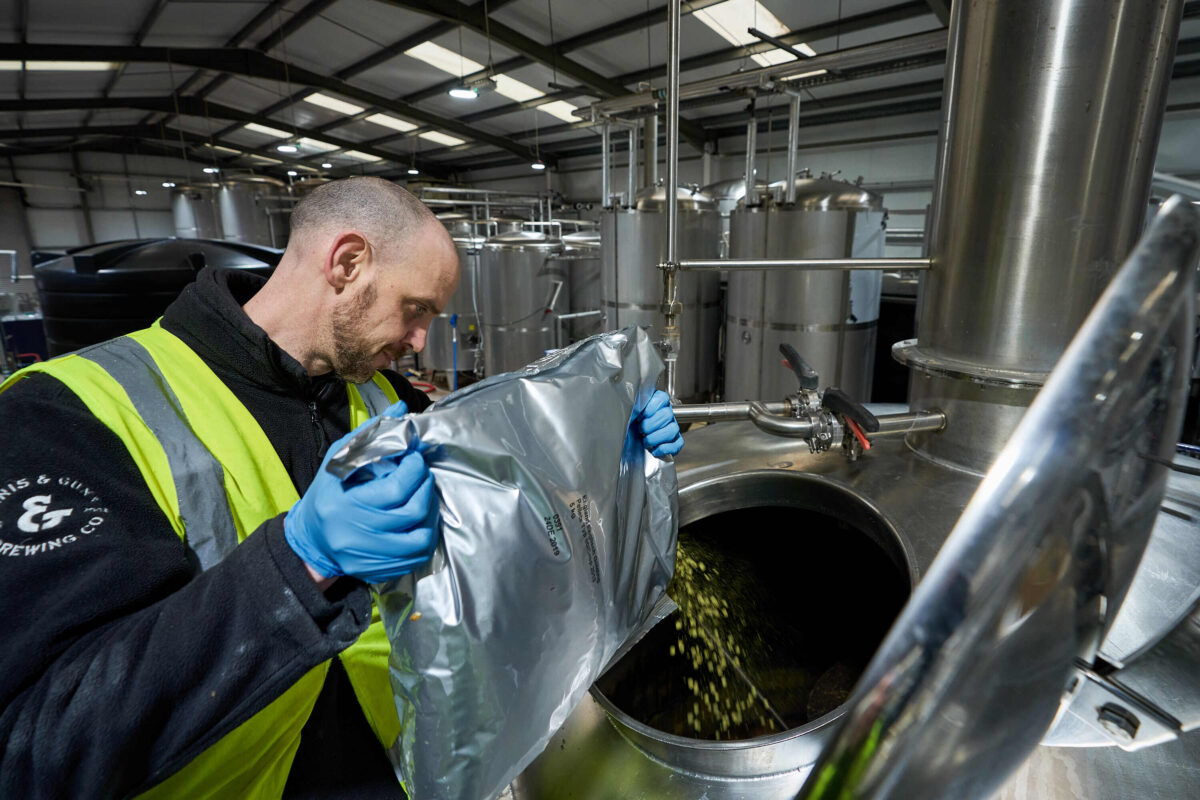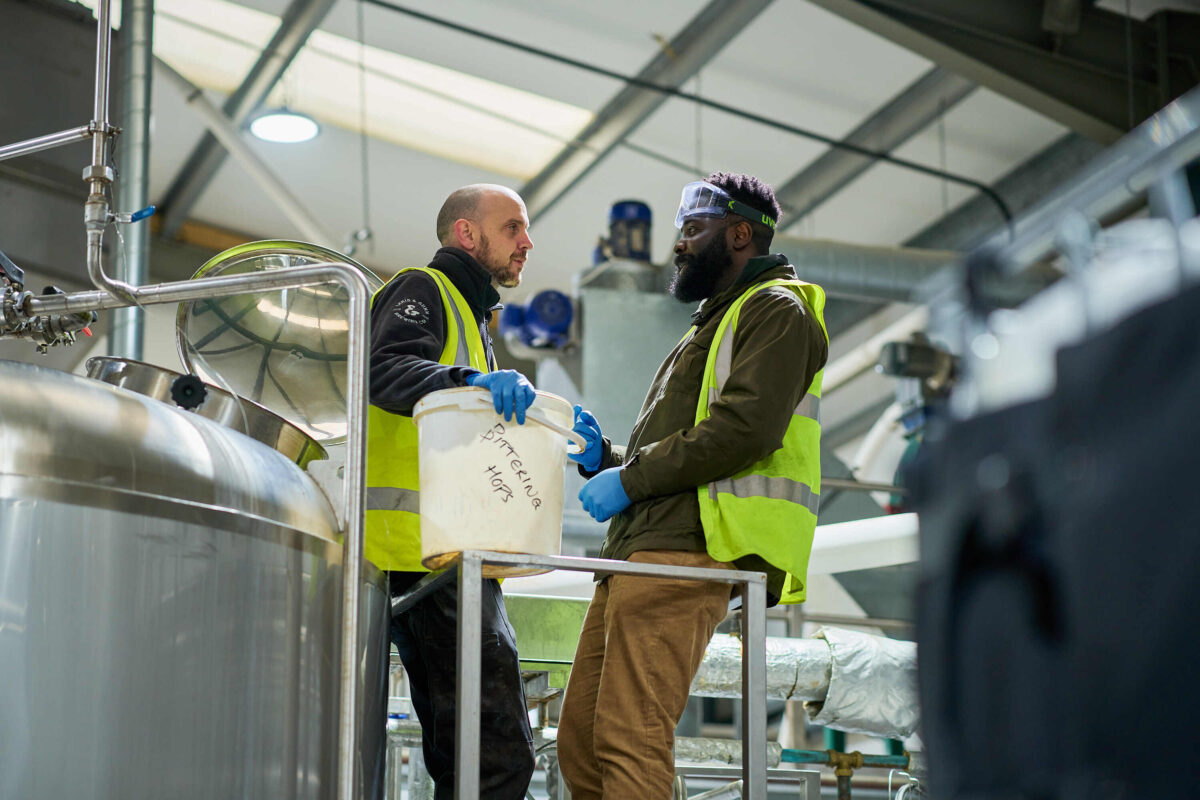Innis & Gunn | Brewing Greener from Their Home in Perth
Innis & Gunn, the Scottish brewer renowned for ‘The Original’ whisky cask beer, acquired Inveralmond Brewery in Perth in 2016 and quickly established it as their home for innovation and cask maturation.
Launched by Dougal Gunn Sharp in 2003, Innis & Gunn has evolved to become a multi-award-winning brand, producing a range of core and limited-edition beers as well as the Inveralmond Brewery cask ales. The Original continues to be their flagship beer and Innis & Gunn Lager is a top 10 premium lager brand in Scotland, ahead of large global competitors including Heineken, Estrella Damm and Staropramen.
Alex Cox, Site Leader at their Perth brewery, oversees the production of around 50,000 litres of beer each week, and is responsible for ensuring consistency in taste, quality and production.
In 2024, the company successfully applied for a Green Capital Development Grant from Perth & Kinross Council and were awarded £25,000 to invest a total of £60,000 into improving their brewing process.
This has included the addition of new pumps, which speed up the process overall, and new steam plate heat exchangers, which offer significant heat transfer improvements. Installed in January this year, the new kit is expected to increase production by 33%, making Innis & Gunn one of the largest independent brewers in Scotland.
Alex commented, “Our brewing capacity is around 50,000 litres of beer a week, but this new kit will maximise what the brewhouse can achieve, and we expect to increase production by one third, to 75,000 litres.
“The overall increase is significant, but it will be achieved through incremental improvements across the production process. For example, the process of separating wort would have taken us around 3 hours for each batch and we’ve now halved that to 1.5 hours.
“When it comes to mashing in, we can now blend our hot liquor to achieve the right temperature, meaning we’re cutting out the time needed for reheating, as well as saving on our cold water consumption.
“In addition to the resource efficiencies, the introduction of a rotary lobe pump system means we can now use liquid maltose. This allows us to brew at high gravity, whilst providing sufficient nutrients to the yeast and better consistency in product quality.
“Brewing beer is an energy-intense exercise, and so when you operate at the scale we do, fluctuations in energy pricing can have serious ramifications across all areas of the business.
“By addressing how much energy is consumed on every batch of beer brewed, we’ve stabilised our costs and reduced our carbon emissions. We’ll save around £9,000 a year on gas bills alone, which is 25T of CO2(e). The savings made by using liquid sugar are another £1,600 a year, and while that is a small gain, add it to the £28,000 saved in other material efficiencies, and incrementally, it all makes a difference to the bottom line.”

As well as savings across costs and carbon emissions, the investment has also led to a more efficient production process. As a small team – there are only four brewers on site, each working five days, on a back-to-back shift rotation – the production efficiencies made amount to a significant increase.
“We can now brew three times a day instead of two, thereby squeezing the operating window into a shorter period. The kit was installed in January this year, and I would expect to be seeing the full benefits of it by mid-summer when we aim to increase brewing capacity by a third. That will take us from 25,000 hectolitres each year, to 37,500 hectolitres – to put that into terms people understand, we’ll be producing 6.6 million pints a year!
“Innis & Gunn has always been known for pushing the boundaries, and the pioneering of new brewing techniques for a more carbon-friendly beer, is simply an extension of that entrepreneurial spirit.”
Why Perth?
“Perth is our only brewing site in the UK and its central location, and access to the road network, offers an ideal position for our tankers to distribute to our co-packers where the beer is canned, bottled or kegged. We move around 25,000-75,000 litres each week, which is only going to increase.
“We use malted pale barley in all of our recipes, and we source this from in and around the area, and up the east coast of Scotland. This is mixed with speciality malts to add colour, body, aroma and flavour giving our beer its distinct characteristics.
“Perth is renowned for its quality food and drink manufacturers, and we are proud to sit alongside the many great whisky distilleries and award-winning producers that can be found throughout the area.”
Inspiring the Next Generation of Brewers

For the past three years, Innis & Gunn has had an ongoing partnership with the Food Science department in Abertay University in Dundee. Offering industry placement opportunities, the result is a mutually beneficial exercise that rewards both student and brewery.
Turner Olunamonowo is studying a Masters in Food Quality, Safety and Innovation at Abertay University and has a 12-week industrial placement at Innis & Gunn.
Turner explains, “These placements are designed to be a win-win. As a student, my main objective is to gain experience, knowledge and practical skills in the real world. While doing this, I can observe and develop insights into the procedures and practices and offer an outsider’s perspective on improving efficiencies.
“I could have chosen to do a dissertation, but this hands-on experience has been hugely beneficial. My lecturer works with Alex and the team and visits me here in the brewery to observe and discuss my findings. I’m focused on the cleaning procedure, which may sound dull, but brewing is 95% cleaning and sanitising. If you can improve efficiencies and processes here, you can make great gains.”
The process has a proven track record. Jonathan “Digger” Robinson, the technical project brewer, has been with the brewery for 12 years. A chef to trade, he joined Inveralmond Brewery (as it was then) following a 10-week placement during his Food & Consumer Science degree.
